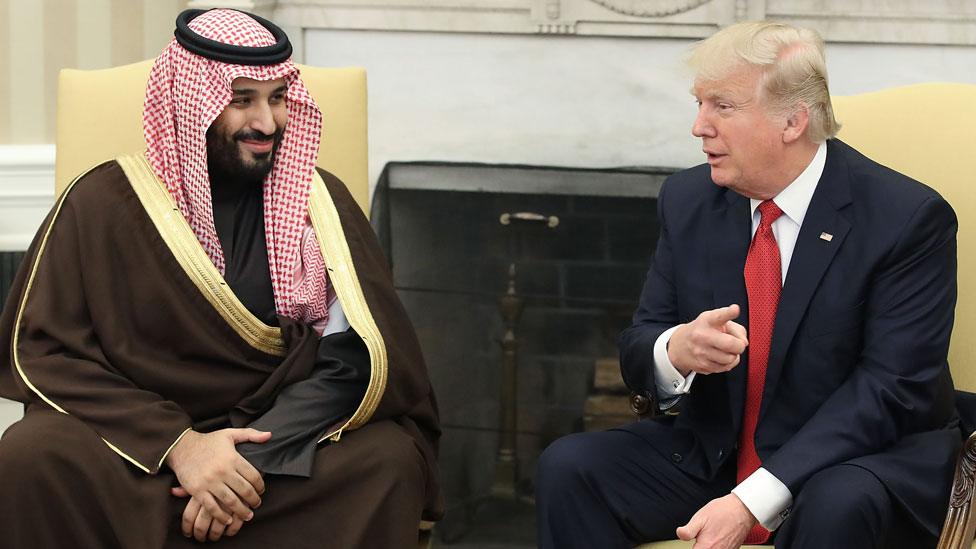Trumplomacy: What does US embrace of the Saudis mean?
- Published

Trump with Mohammed bin Salman, Saudi Deputy Crown Prince
In the space of one afternoon this week, Rex Tillerson encapsulated the administration's policy shift in the Persian Gulf.
At noon on Wednesday, he was championing economic ties between the US and Saudi Arabia at a joint "CEO summit" organised by the US Chamber of Commerce, promising full consular support to facilitate trade and investment.
A few hours later he was comparing Iran to North Korea and excoriating it for "alarming and ongoing provocations" that undermine US interests in countries such as Yemen, Iraq, Syria and Lebanon.
The decision to adopt a more aggressive approach towards Iran and a stronger tilt towards Saudi Arabia has been taking shape since Tehran was first put "on notice" in February by then National Security Adviser Michael Flynn.
The Saudis have been effusive about this "turning point," welcoming the reset in a relationship strained by Barack Obama's pursuit of a nuclear deal with their Shia rival, and his criticism of their messy involvement in Yemen's civil war.
The secretary of defence and Iran hawk James Mattis fleshed it out further during a trip to Riyadh, also on Wednesday, as it happens.
He stressed the importance of "reinforcing Saudi Arabia's resistance to Iran's mischief," seeing, like his Saudi hosts, a malign Iranian hand "everywhere…there is trouble in the region."
What does this mean?
First, that the future of the deal restricting Iran's nuclear programme is in doubt. Although, as I wrote earlier this week it is more likely to fail by way of the administration piling pressure on Tehran than formally withdrawing from the agreement.
Secondly, the possibility of greater US involvement in Yemen's civil war, which the UN says has killed 10,000 civilians and brought 17 million to the verge of starvation.
Currently the US provides indirect assistance to a coalition made up principally of Saudi Arabia and the United Arab Emirates, who are fighting Iran-backed Houthi rebels.
And that was significantly scaled back by the Obama administration because of the number of civilians killed by indiscriminate Saudi air strikes.
Three things we've learnt on Trump diplomacy
The Trump White House is looking to resume missile sales frozen by Obama.
And it's considering intelligence and planning support, external for an Emirati-led offensive to retake the Houthi-held port of Hodeida, a vital avenue for humanitarian aid, but also for rebel supplies.
A US official travelling with General Mattis told the Voice of America, external that the Trump administration doesn't believe the Houthis will return to the negotiating table without more military pressure.
This is also the Saudi position. In fact, Trump's team has adopted the Saudi and Emirati narrative about the conflict to a much greater degree than the Obama administration, which is that Iran has been actively supporting and directing the Houthi uprising as a means of gaining leverage over the Sunni Arab states in the region.
For nearly 60 years the US has sought to keep any one power, other than itself, from becoming dominant in the strategically important oil rich Gulf.
And since the Iranian revolution in 1979 it has forged a de-facto military alliance with the Sunni monarchies to deter Tehran.
Obama tinkered with that balance, hoping the nuclear deal would empower moderates in Iran who could normalise relations with their regional rivals.
The Trump administration has not only rejected that as a failed approach, it has signalled its willingness to confront, rather than contain, the Islamic Republic.
